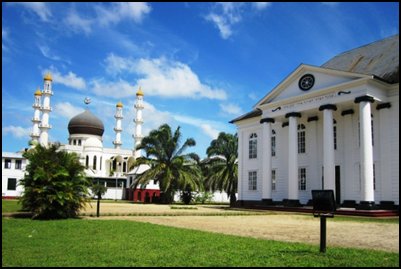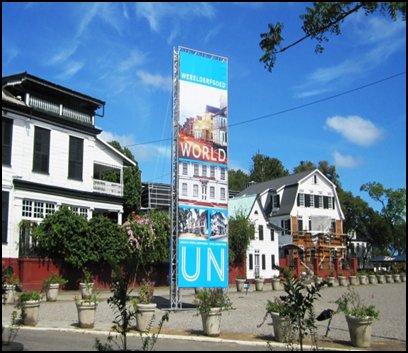
The Faculty of Law welcomes back Professor Joanna Harrington, who spent part of February in Paramaribo, Suriname - the smallest independent country in South America - teaching an intensive course on international human rights law and state reporting as part of a collaborative capacity-building project sponsored by the United Nations Development Programme (UNDP) and the Surinamese Ministry of Justice and Police.
Twenty public sector officials and government lawyers took part in the intensive course, each selected to serve as a human rights focal point within their respective ministries of the Surinamese Government, including the ministries of justice, foreign affairs, regional development, home affairs and social affairs. The course was held in the capital city, organized by the FHR Lim A Po Institute for Social Studies in partnership with the Institute of Social Studies of Erasmus University Rotterdam (ISS-EUR) in the Netherlands, and held in former Dutch colonial buildings now designated a UNESCO World Heritage Site.
 "Like many countries, Suriname has received recommendations for improvement from the international human rights treaty monitoring bodies and from states under the new Universal Periodic Review mechanism of the Human Rights Council. This project is an important step towards building a human rights culture within the government of Suriname," explained Professor Harrington. "The aim of the project is to enhance awareness and understanding, with a view to incorporating international standards within national laws and institutions."
"Like many countries, Suriname has received recommendations for improvement from the international human rights treaty monitoring bodies and from states under the new Universal Periodic Review mechanism of the Human Rights Council. This project is an important step towards building a human rights culture within the government of Suriname," explained Professor Harrington. "The aim of the project is to enhance awareness and understanding, with a view to incorporating international standards within national laws and institutions."
Of great interest to the course participants were the protections afforded under international law to the rights of indigenous and tribal peoples, with Suriname being home to both Amerindians and the descendants of former slaves, known as the Maroons, who escaped the plantations to establish communities in the Amazonian forests. The Inter-American Court of Human Rights has issued several important judgments requiring Suriname to recognize the collective land rights of its indigenous peoples; a subject matter with which Professor Harrington has some familiarity having been involved in the negotiations leading to the adoption of the United Nations Declaration on the Rights of Indigenous Peoples in 2007.
While in Suriname, Professor Harrington also presented at a seminar for business professionals and private sector lawyers on recent developments in corporate social responsibility, including the new UN Guiding Principles on Business and Human Rights, with many in the audience working in the natural resource extraction industries. Suriname's rich deposits of bauxite, oil and gold have long attracted foreign interest and investment.
 Travelling to a country that is off the beaten path, as recognized recently by the New York Times, also provides Dr. Harrington with a unique experience to share with her students at the University of Alberta, especially those interested in international development work and the protection of human rights "on the ground". As Professor Harrington explained: "Law students may be surprised to know, for example, that there are only 19 judges in all of Suriname, but 10 of the 19 are women. The training of more judges is currently underway." Suriname is also famous for having been the colony that was traded by the British for what was then a small trading post known as New Amsterdam - now New York City.
Travelling to a country that is off the beaten path, as recognized recently by the New York Times, also provides Dr. Harrington with a unique experience to share with her students at the University of Alberta, especially those interested in international development work and the protection of human rights "on the ground". As Professor Harrington explained: "Law students may be surprised to know, for example, that there are only 19 judges in all of Suriname, but 10 of the 19 are women. The training of more judges is currently underway." Suriname is also famous for having been the colony that was traded by the British for what was then a small trading post known as New Amsterdam - now New York City.